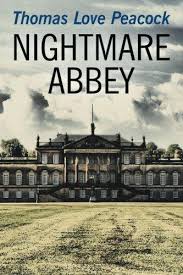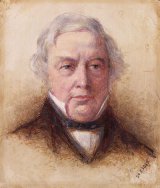Nightmare Abbey Page #5
Nightmare Abbey is an 1818 novella by Thomas Love Peacock, and his third long work of fiction to be published.
'Nothing else, certainly,' said Scythrop: 'you are perfectly in the right, Mr Toobad. Evil, and mischief, and misery, and confusion, and vanity, and vexation of spirit, and death, and disease, and assassination, and war, and poverty, and pestilence, and famine, and avarice, and selfishness, and rancour, and jealousy, and spleen, and malevolence, and the disappointments of philanthropy, and the faithlessness of friendship, and the crosses of love--all prove the accuracy of your views, and the truth of your system; and it is not impossible that the infernal interruption of this fall downstairs may throw a colour of evil on the whole of my future existence.' 'My dear boy,' said Mr Toobad, 'you have a fine eye for consequences.' So saying, he embraced Scythrop, who retired, with a disconsolate step, to dress for dinner; while Mr Toobad stalked across the hall, repeating, 'Woe to the inhabiters of the earth, and of the sea, for the devil is come among you, having great wrath.' * * * * * CHAPTER IV The flight of Marionetta, and the pursuit of Scythrop, had been witnessed by Mr Glowry, who, in consequence, narrowly observed his son and his niece in the evening; and, concluding from their manner, that there was a better understanding between them than he wished to see, he determined on obtaining the next morning from Scythrop a full and satisfactory explanation. He, therefore, shortly after breakfast, entered Scythrop's tower, with a very grave face, and said, without ceremony or preface, 'So, sir, you are in love with your cousin.' Scythrop, with as little hesitation, answered, 'Yes, sir.' 'That is candid, at least; and she is in love with you.' 'I wish she were, sir.' 'You know she is, sir.' 'Indeed, sir, I do not.' 'But you hope she is.' 'I do, from my soul.' 'Now that is very provoking, Scythrop, and very disappointing: I could not have supposed that you, Scythrop Glowry, of Nightmare Abbey, would have been infatuated with such a dancing, laughing, singing, thoughtless, careless, merry-hearted thing, as Marionetta--in all respects the reverse of you and me. It is very disappointing, Scythrop. And do you know, sir, that Marionetta has no fortune?' 'It is the more reason, sir, that her husband should have one.' 'The more reason for her; but not for you. My wife had no fortune, and I had no consolation in my calamity. And do you reflect, sir, what an enormous slice this lawsuit has cut out of our family estate? we who used to be the greatest landed proprietors in Lincolnshire.' 'To be sure, sir, we had more acres of fen than any man on this coast: but what are fens to love? What are dykes and windmills to Marionetta?' 'And what, sir, is love to a windmill? Not grist, I am certain: besides, sir, I have made a choice for you. I have made a choice for you, Scythrop. Beauty, genius, accomplishments, and a great fortune into the bargain. Such a lovely, serious creature, in a fine state of high dissatisfaction with the world, and every thing in it. Such a delightful surprise I had prepared for you. Sir, I have pledged my honour to the contract--the honour of the Glowries of Nightmare Abbey: and now, sir, what is to be done?' 'Indeed, sir, I cannot say. I claim, on this occasion, that liberty of action which is the co-natal prerogative of every rational being.' 'Liberty of action, sir? there is no such thing as liberty of action. We are all slaves and puppets of a blind and unpathetic necessity.' 'Very true, sir; but liberty of action, between individuals, consists in their being differently influenced, or modified, by the same universal necessity; so that the results are unconsentaneous, and their respective necessitated volitions clash and fly off in a tangent.' 'Your logic is good, sir: but you are aware, too, that one individual may be a medium of adhibiting to another a mode or form of necessity, which may have more or less influence in the production of consentaneity; and, therefore, sir, if you do not comply with my wishes in this instance (you have had your own way in every thing else), I shall be under the necessity of disinheriting you, though I shall do it with tears in my eyes.' Having said these words, he vanished suddenly, in the dread of Scythrop's logic. Mr Glowry immediately sought Mrs Hilary, and communicated to her his views of the case in point. Mrs Hilary, as the phrase is, was as fond of Marionetta as if she had been her own child: but--there is always a but on these occasions--she could do nothing for her in the way of fortune, as she had two hopeful sons, who were finishing their education at Brazen-nose, and who would not like to encounter any diminution of their prospects, when they should be brought out of the house of mental bondage--i.e. the university--to the land flowing with milk and honey--i.e. the west end of London. Mrs Hilary hinted to Marionetta, that propriety, and delicacy, and decorum, and dignity, &c. &c. &c.,[3] would require them to leave the Abbey immediately. Marionetta listened in silent submission, for she knew that her inheritance was passive obedience; but, when Scythrop, who had watched the opportunity of Mrs Hilary's departure, entered, and, without speaking a word, threw himself at her feet in a paroxysm of grief, the young lady, in equal silence and sorrow, threw her arms round his neck and burst into tears. A very tender scene ensued, which the sympathetic susceptibilities of the soft-hearted reader can more accurately imagine than we can delineate. But when Marionetta hinted that she was to leave the Abbey immediately, Scythrop snatched from its repository his ancestor's skull, filled it with Madeira, and presenting himself before Mr Glowry, threatened to drink off the contents if Mr Glowry did not immediately promise that Marionetta should not be taken from the Abbey without her own consent. Mr Glowry, who took the Madeira to be some deadly brewage, gave the required promise in dismal panic. Scythrop returned to Marionetta with a joyful heart, and drank the Madeira by the way. Mr Glowry, during his residence in London, had come to an agreement with his friend Mr Toobad, that a match between Scythrop and Mr Toobad's daughter would be a very desirable occurrence. She was finishing her education in a German convent, but Mr Toobad described her as being fully impressed with the truth of his Ahrimanic philosophy,[4] and being altogether as gloomy and antithalian a young lady as Mr Glowry himself could desire for the future mistress of Nightmare Abbey. She had a great fortune in her own right, which was not, as we have seen, without its weight in inducing Mr Glowry to set his heart upon her as his daughter-in-law that was to be; he was therefore very much disturbed by Scythrop's untoward attachment to Marionetta. He condoled on the occasion with Mr Toobad; who said, that he had been too long accustomed to the intermeddling of the devil in all his affairs, to be astonished at this new trace of his cloven claw; but that he hoped to outwit him yet, for he was sure there could be no comparison between his daughter and Marionetta in the mind of any one who had a proper perception of the fact, that, the world being a great theatre of evil, seriousness and solemnity are the characteristics of wisdom, and laughter and merriment make a human being no better than a baboon. Mr Glowry comforted himself with this view of the subject, and urged Mr Toobad to expedite his daughter's return from Germany. Mr Toobad said he was in daily expectation of her arrival in London, and would set off immediately to meet her, that he might lose no time in bringing her to Nightmare Abbey. 'Then,' he added, 'we shall see whether Thalia or Melpomene--whether the Allegra or the Penserosa--will carry off the symbol of victory.'--'There can be no doubt,' said Mr Glowry, 'which way the scale will incline, or Scythrop is no true scion of the venerable stem of the Glowries.'
Translation
Translate and read this book in other languages:
Select another language:
- - Select -
- 简体中文 (Chinese - Simplified)
- 繁體中文 (Chinese - Traditional)
- Español (Spanish)
- Esperanto (Esperanto)
- 日本語 (Japanese)
- Português (Portuguese)
- Deutsch (German)
- العربية (Arabic)
- Français (French)
- Русский (Russian)
- ಕನ್ನಡ (Kannada)
- 한국어 (Korean)
- עברית (Hebrew)
- Gaeilge (Irish)
- Українська (Ukrainian)
- اردو (Urdu)
- Magyar (Hungarian)
- मानक हिन्दी (Hindi)
- Indonesia (Indonesian)
- Italiano (Italian)
- தமிழ் (Tamil)
- Türkçe (Turkish)
- తెలుగు (Telugu)
- ภาษาไทย (Thai)
- Tiếng Việt (Vietnamese)
- Čeština (Czech)
- Polski (Polish)
- Bahasa Indonesia (Indonesian)
- Românește (Romanian)
- Nederlands (Dutch)
- Ελληνικά (Greek)
- Latinum (Latin)
- Svenska (Swedish)
- Dansk (Danish)
- Suomi (Finnish)
- فارسی (Persian)
- ייִדיש (Yiddish)
- հայերեն (Armenian)
- Norsk (Norwegian)
- English (English)
Citation
Use the citation below to add this book to your bibliography:
Style:MLAChicagoAPA
"Nightmare Abbey Books." Literature.com. STANDS4 LLC, 2024. Web. 23 Nov. 2024. <https://www.literature.com/book/nightmare_abbey_48>.




Discuss this Nightmare Abbey book with the community:
Report Comment
We're doing our best to make sure our content is useful, accurate and safe.
If by any chance you spot an inappropriate comment while navigating through our website please use this form to let us know, and we'll take care of it shortly.
Attachment
You need to be logged in to favorite.
Log In